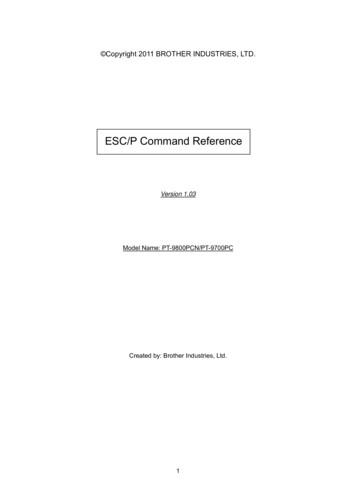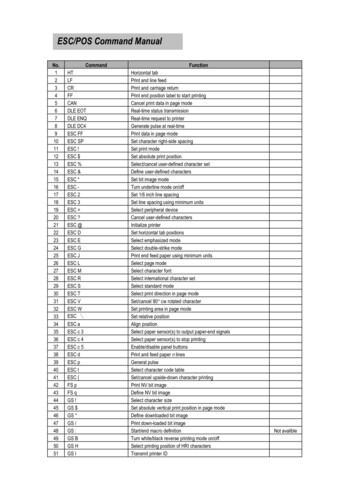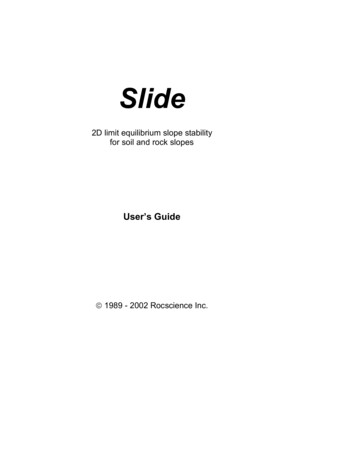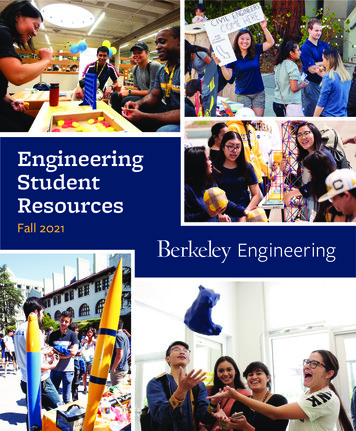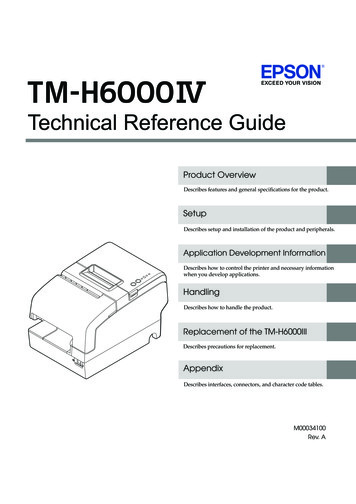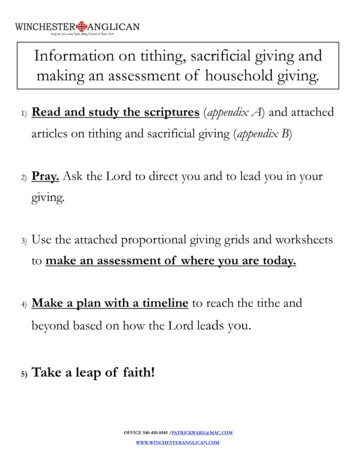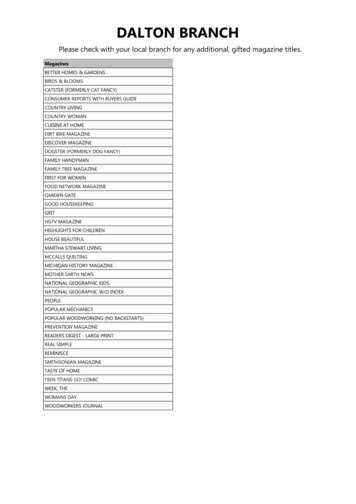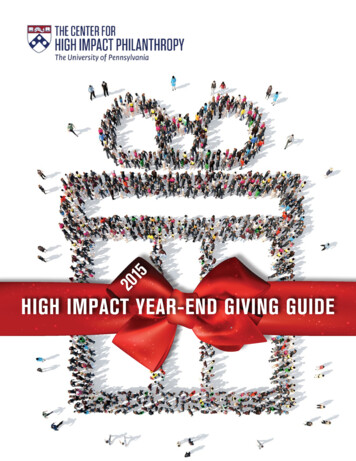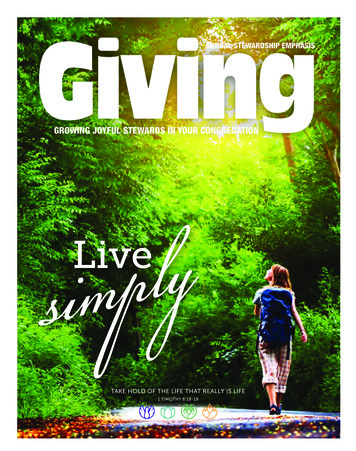
Transcription
1ESC Giving Magazine 11-15.indd 11/6/16 3:52 PM
Thank YouMany people support the mission and ministry of the Ecumenical Stewardship Center with gifts of time,talent, and financial resources. The contributions of the Ecumenical Stewardship Center Board of Directors,denominational partners, associate partners, and Resource Editorial Team are gratefully acknowledged.Board of DirectorsDavid ArmourDirector of PhilanthropyThe United Church of CanadaToronto, OntarioRebekah Burch BasingerConsultant for Fundraising and Board EducationBasinger ConsultingDillsburg, PennsylvaniaStacy EmersonStewardship Facilitator, American Baptist Churches USAPastor, First Baptist Church of West HartfordWest Hartford, ConnecticutMandy GarciaCommunications ConsultantElgin, IllinoisKaren LaylandDirector of Communications andStewardship EducationBarnabas FoundationTinley Park, IllinoisJanet LongSenior PastorWashington Avenue Christian Church(Disciples of Christ)Elyria, OhioClayton SmithExecutive Pastor, Generosity,Foundation & Crossroads MinistriesUnited Methodist Church of the ResurrectionLeawood, KansasJeff SteckleyMinisterNew Hanburg, OntarioDenominational PartnersAfrican Methodist Episcopal ChurchAmerican Baptist Churches USAChristian Church (Disciples of Christ)Christian Reformed Church/Barnabas FoundationChurch of the BrethrenChurch of GodCommunity of ChristCumberland Presbyterian ChurchEpiscopal Church USAEvangelical Covenant ChurchEvangelical Lutheran Church in AmericaEvangelical Lutheran Church in CanadaFriends United MeetingMennonite Church USA/EverenceMoravian Church Northern ProvinceThe Presbyterian Church in CanadaPresbyterian Church USAThe United Church of CanadaUnited Church of ChristThe United Methodist ChurchAssociate PartnersAmerican Baptist FoundationChristian Church FoundationLCMS FoundationMennonite Foundation of CanadaStewardship of Life InstituteThe Episcopal Network for StewardshipToronto United Church CouncilUnited Methodist Foundation of MichiganUnited Methodist Stewardship FoundationResource Editorial TeamSara Alvarez, Mennonite Church USAMarc Kirchoff, American Baptist Churches USASteve Oelschlager, Evangelical Lutheran Church in AmericaKaren Plater, Presbyterian Church in CanadaBetsy Schwarzentraub, United Methodist ChurchHermann Weinlick, Moravian Church in North America2ESC Giving Magazine 11-15.indd 21/6/16 3:52 PM
growjoyous, abundant generosityin your congregationAs members of the ELCA, we believe that we are freed in Christto serve and love our neighbors. How do we respond to God’scall to serve and love our neighbors?We faithfully steward the gifts God has so abundantly given to us. Good stewardship is abouthow we use all that God has entrusted to our care — our time, our talents and our treasures —to love God and our neighbors, both inside and outside of the church walls and our homes.As you focus on your congregation’s stewardship ministry, there are numerous resources andservices available to you through the ELCA churchwide office. Whether it’s coaching, monthlyinspiration delivered to your inbox or themed materials to inspire your congregation, you’ll beamazed by the many offerings that can help you grow joyous, abundant generosity.FOR MORE INFORMATION:Please contact your synod office, or visit www.ELCA.org/stewardship,or e-mail stewardship@elca.org
WEDECLAREGOD’SWORKREDISCOVERMACEDONIAOnline stewardshippresentations fromELCA leadersEmail stewardship@elca.org for moreinformationTHE GENEROSITYPROJECTResources to nurturestewardship throughintergenerationalconversationFor more information,email ACEDONIAMISSIONINTERPRETATIONVENTURES INGROWINGSTEWARDSWorkshop series toincrease giving andyear-round ministryTo learn more, contactyour Director forEvangelical Mission(www.ELCA.org/tools/findaperson)Collection of themedresources to reconnectmembers to faithand givingAvailable at URVEYSTEWARDS OFGOD’S LOVEA year-round guideto stewardship inyour congregationAvailable at www.ELCA.org/growingstewardsTool to assesscongregationalengagementFor more information,email stewardship@elca.orgSTORIES OFFAITH IN ACTIONSTEWARDNETE-NEWSLETTERFree publicationcontaining storiesfrom across the ELCA,and resources togrow supportAvailable at www.ELCA.org/resourcesIdeas and inspirationfor church leaders andmission interpreters Sign up at www.ELCA.org/growingstewardsCOMPETENCIESResource outlining bestpractices and perspectives for leadersAvailable at www.ELCA.org/resourcesCommunication toolsand training for declaringGod’s workTo learn more, contactyour Director forEvangelical Mission(www.ELCA.org/tools/findaperson)for more informationVisit www.ELCA.org/stewardship or contactstewardship@elca.org
ContentsVolume 182From the ESCExecutive DirectorMarcia Shetler3Simple Living andChristian StewardshipM. Douglas Meeks6Not So Simple:Living in ChristAdam J. Copeland8Cultivating ContentmentFive Steps for SimplifyingYour LifeAdam Hamilton10 Simple LivingLynn Miller12 Keeping It Simple in aHigh Tech CultureNathan Dungan14 Generosity inCommunityAn Interview with ShaneClaiborne16 Making it Simple forPersons to GiveDavid S. Bell18 Sacrificial Sharing inBurkina Faso GrowsChurchesLynda Hollinger-JanzenCenter Insert19 Helping Youth Movefrom Anxiousness andStress to IntentionalityLive SimplyPaul Amlin20 Green Burials: AConversation WorthHavingBeryl Jantzi22 Confessions of aRecovering ConsumeristMeribeth Westerfield24 Reducing College Debt:a Group RideWA community slides towardlower education loansDebon Matthews26 Clergy and MoneyUnderstanding theComplexity of OurRelationship With Moneycomes thewith changed rate. Alongions,change at a rapinology, possesse experiencees, cars, techgedrade our hom, we are encoura sopressure to upggthe same timeAtdoinrns.sideatioforced to coneducation, vocandarewewayapspleror perhfor a simto economize,otomy, we longes. In this dichcircumstanct to hearbecause of ourwe also wanbut,life.talkofingemphasis,! We hear lotsa less demandstewardshipus with all thisLive Simplyrs fourGod can helpation uses thisemphasis offeyour congregLive Simplyardship StewGod talk. Asthe clutter. Themeal of Stew’s voice abovewith a simpleinglisten for Godinates:themship focus, culms has four subhasiempweeks of worent Sunday. Thesand a commitmply: Follow Jesu Live SimTruthply: Face the Live Simrply: Act TogetheSim LiveEnoughreShaply: Live Sim4 when he sayst in Philippiansto moreof contentmenetsecration learnsplesimyour congregyou canPaul shares hisugh Christ. Ascommunity,all things throand serving inng—lifelovilethat he can dowhilife and faithrely on Jesusand abundantandsweroufollogenfullyof a simple yetjoythenceexperielife.islythat realLive Simplyion isly center sectThis Live Simple resourceMake It Simpbased on theand annualhip educationfor stewardsEvangelicalished by thepublonserespch in America.Lutheran Churhip Center 101enical Stewards 2016 Ecum47374Richmond, INQuaker Hill Driveil: office@278-4372, EmaPhone/Fax preWebsite: wwwducegranted to reproPermission isfor use inof this insertany portiontion.your congregaMike Little and Susan Taylor28 Helping Kids LiveSimplyJenny Moran30 Resource ReviewsGiving: Growing JoyfulStewards in Your Congregationis published annually by theEcumenical Sterwardship Center.All scripture referances are fromthe NRSV unless otherwise noted. 2016 Ecumenical Stewardship Center,101 Quaker Hill Drive, Richmond, IN 47374Phone/Fax: (855) 278-4372 (4ESC)Email: urces.orgGivingESC Giving Magazine 11-15.indd 1111/6/16 3:52 PM
From the ESCExecutive DirectorMarcia Shetler“Not that I am referring to being in need; for I have learned to be contentwith whatever I have.”M– Philippians 4:11, NRSVany North Americans are on a continuous quest to live more simply.For decades, we have created tools and technology with the goalof making our lives easier. Today, some efforts to live simply try tocounter our complex, consumer-focused lifestyle: growing and eatingsimpler food from personal gardens, building micro-sized living quarters, andlooking for ways to reduce our carbon footprints.Even so, naming that we are on this quest says something about our day-to-daylives of privilege. Our jobs, relationships, and social activities are often demanding.Simply finding rest is a luxury: Sabbath rest seems like an impossibility. Our effortsto do, be, and have the best leave us tired and unsatisfied. If there is a simple life,where is it?Paul’s words in Philippians give us an important clue: “I have learned tobe content with whatever I have.” (Phil. 4:11) That kind of contentment iscountercultural and not easily embraced by our human nature. Perhaps we cantake comfort that even for Paul, finding contentment was learned behavior.In this volume of Giving, Christian stewardship thought leaders fromthroughout North America offer spiritual insights and practical ideas for findingcontentment through simpler living. The center section offers guidelines forcreating a financial stewardship emphasis, including resources for four worshipservices and a special meal event. You can enhance your emphasis even furtherwith additional Live Simply resources from the Ecumenical Stewardship Center—see the back cover for more information.We know that Paul’s contentment came from his life in Christ. One of thesimplest—and at the same time most comprehensive—descriptions of Christianstewardship is that it is “everything we do after we say we believe.” Giving volume18 is the second in a four-year series based on I Timothy 6:18-19: “Commandthem to do good, to be rich in good deeds, and to be generous and willing toshare. In this way they will lay up treasure for themselves as a firm foundationfor the coming age, so that they may take hold of the life that is truly life.” Livingmore simply involves reclaiming Christian discipleship as our priority, includingstewarding our resources faithfully and giving generously. It is my hope, and thehope of the Ecumenical Stewardship Center Resource Editorial Team, that thismagazine and related materials will help your congregation let go of the excessclutter and take hold of the life that is truly life, ready to receive and give all thatGod has in store for you and your mission and ministry.2Marcia Shetler, Executive Director/CEOEcumenical Stewardship CenterGivingESC Giving Magazine 11-15.indd 21/6/16 3:52 PM
Simple Living andChristian StewardshipM. Douglas MeeksThe major religions and manyphilosophies, east and west, haverecommended the simple life as thekey to happiness. All agree that thesimple life means freedom. You mustbe free to live simply; living simplymakes you free. But if freedom is the pulsating heartof living simply, how is freedom gained? Accordingto most wisdom teaching throughout the ages, thismeans learning to free our time, attention, anddevotion from slavery to possessions, to unbridledconsumption, to thralldom to our work, and tofalse obligations in wrong relationships. Indeed,these insights are helpful for Christian stewardshipbecause they go a long way in helping us to answerthe question, why are we so poor at giving? Why dowe have so little life-fulfilling time, such a paucity ofattention to what really counts, and such a scarcity ofdevotion that could hold our lives together?The biblical view of stewardship generally sharesthese views about the wisdom of simple living. Butis there anything distinctive about the Christian viewof stewardship beyond these teachings about thefreedom of the simple life?The view of Christian life in 1 Timothy 6:18-19 isa good place to begin: “[The followers of Jesus] areto do good, to be rich in good works, generous, andready to share, thus storing up for themselves thetreasure of a good foundation for the future, so thatthey may take hold of the life that really is life.” Thewriter of 1 Timothy uses the language of economiclife to speak of Christian living. He contrasts what weusually expect in everyday economic life with “the lifethat really is life.” What we normally see in economiclife is the pursuit of wealth by “storing up treasure.”The search for profit and the passion for accumulatingGivingESC Giving Magazine 11-15.indd 331/6/16 3:52 PM
wealth govern our time, attention, and devotion. Inthis era when money is essentially credit, money ascredit is the value by which we evaluate all things andrelationships. The bottom line of one’s bank accountand the gross domestic product of a nation are the fixedstandards. This way of measuring life, however, does notfree us for a simple life.But who really can doubt that accumulating wealthis key to a secure future? Those who follow Jesus Christwill doubt this. The standards of being rich and storingup treasure cause us to mismeasure our lives. They leadus into unfreedom. How, then, should we take hold of thelife that is really life? What makes for simple life?Often it is claimed that the secret of simpleliving is giving up something. Renunciation turnsinto denunciation as the epitome of simplicity. Butfor Christian stewardship, neither renunciation nordenunciation is the secret of what is really life. For Jesusthe simple life is centered in his command: Seek youfirst the kingdom of God. Stewardship is for serving thekingdom of God, that is, the reign of God’s righteousness,God’s power of life over death in all its forms. ForJesus the secret of the simple life is loving God and theneighbor Jesus gives us. The simplicity of Christianlife depends completely on the love of God that makespossible the love of the neighbor and the love of theneighbor that embodies the love of God. The freedom ofthe simple life is for the love of God and neighbor.To be sure, the simple life means freedom frompossessions, from over consumption, from dehumanizingwork, and from debt, but this freedom is for what God4loves—all human beings and all creatures God hascalled into being.Freedom from PossessionsThe treasure of a good foundation for the future isnot storing up possessions. It is rather freedom fromour enslavement to possessions. When our time, ourattention, and our devotion are absorbed by what wepossess, we end up being possessed by our possessions.More and more people are realizing that they havetoo many devices, implements, policies, interests, andrelationships. What we have makes us be-have in waysthat devour our life energy. Jesus says to the rich youngruler: Sell all you have and give to the poor. To all whowould follow, Jesus gives a radical message of simplicity:Follow me into the neighborhood of the neighbor, andtake with you no money, no purse, no second cloak: eatwhat is set before you. But it gets even more radical:Leave behind mother and father, spouse, and children.This, simply put, is the freedom of the simple life, nolonger being bound by anything or any relationshipexcept the rule of God’s righteousness.Here, however, the Christian perspective on thesimple life separates from other views. If you are striving“first for the kingdom of God and God’s righteousness—all these things will be given to you as well” (Matt 6:33).The simple life is not bereft of things and relationships,but it means having them in a radically differentrelationship. Everything I have is meant for loving Godand neighbor. To be sure, the simple life requires thereduction of my needs, but the measure is how theGivingESC Giving Magazine 11-15.indd 41/6/16 3:53 PM
reduction of my needs meets the needs of the neighborsJesus gives me.The opposite of being enslaved by our possessionsis generosity. Stewardship means being freed from theclaims of property so that possessions may be usedfor the life God intends for God’s creation, for all ofGod’s creatures. This claim seems radically counterto the person of cultured wants in our time, since it isoften assumed in our society that the person who hasthe most wants is the one to be most admired. But thescripture teaches that we will be in service to someoneor something because that’s the condition of the humanbeing as a creature of desire. The freedom of a simple lifecomes from giving our lives to serving God’s redemptionof the creation. A collect in the Anglican Book ofCommon Prayer expresses this beautifully in a prayer toGod “in whose service is perfect freedom”.Freedom from Over-consumptionAsceticism has been a constant theme of the simplelife. But mere renunciation is not what Jesus expects.Sacrifice not an end in itself. Rather, the aim of Christianlife is the mutual sharing of the feast. The opposite ofgluttonous luxury is the contentment of sharing. Therichness of the simplicity of the eucharist is the model forall of our consumption and, just so, is the epitome of thelife that is really life.Freedom from Enslavement by WorkA simple life of generosity and contentment is oftenruined for us by our absorption in our own work. Humanbeings humiliate and subjugate each other through work,but human beings often enslave themselves throughcompulsion to compete and achieve though work. Butthe simple life of a Christian is not meant to be free ofwork: it rather aims at liberated work for the life of thecommunity. The simple life should not be equated withreducing work through technology or with dropping outof the system or the social fabric in which the neighborsJesus gives us to love are caught. The simple life thriveson satisfaction from relationships rather than fromcareer. It thrives on good works aimed at deepening thelives of others.Freedom from DebtFinally, in the age of money as credit we don’t giveour time, attention, devotion, and money because weare in debt. Radical stewardship in this time meansbeing freed from debt. Many of us in the developedworld don’t understand the seriousness of the prayerJesus commands us to pray: Forgive us our debts aswe forgive our debtors. Financial debt and moral debtare destroying the lives of masses across the world.Forgiveness of debt in all its senses is the most radicalgood work of the simple life that is Christian stewardship.We find the heart of simple life in the command: “Oweno one anything but love.” This means we have toshow ingratitude for what ensnares us in the debt thatdevours life while we show profound gratitude to Godfor “the life that is really life.” The simple life, in theend, is an astounding gift of God that makes us rejoicewithout ceasing.M. Douglas Meeks is the Cal Turner Chancellor Professor of Theology and Wesleyan Studies Emeritus at Vanderbilt Divinity School, where he alsoserves as director of United Methodist Programs and director of the The Turner Center for Church Leadership. Professor Meeks is the author,co-author, or editor of sixteen books, including Origins of the Theology of Hope (Fortress) and God the Economist: The Doctrine of God andPolitical Economy (Fortress).GivingESC Giving Magazine 11-15.indd 551/6/16 3:53 PM
Not So Simple:Living in CAdam J. CopelandNot that I am referring to being in need; for I havelearned to be content with whatever I have.–Philippians 4:11If only simple living were actually simple. I recentlyfound my way to a website dedicated to simple living.The author suggested hiring a style consultant tosimplify one’s wardrobe. Then one could sign-up foran extensive eight-week course on how to live a simplelife. Oh, and I can’t forget the 30 million minimalisthouse featured prominently on the site. The websitemade simple living actually look pretty complicated—and expensive!Katharine, a friend of mine, recently went on a roadtrip that took her near the house of an acquaintance, awoman she had met but was not particularly close to.Katharine values minimalism and thrift, so she asked ifshe might stay the night with her acquaintance. Katharinelater explained to me, “I only expected a shower anda bed and certainly no more than a bowl of cereal forbreakfast. But what I received was a full experience:decadent, home-cooked meals; a collection of newfriends; great conversation; and the warming of a soul thatonly comes with hospitality towards the whole person,perfectly executed.” Katharine sought simplicity, but shereceived generosity.What should we do with this simple-living paradox, thischallenge that for many of us today, living simply takes realwork? Even when we attempt to live simply, we can end upwith another experience entirely. I prefer to look at thosewho were just as baffled some 2000 years ago. “—Not thatI am referring to being in need; for I have learned to becontent with whatever I have,” writes the Apostle Paul fromhis jail cell in Rome (Phil 4:11). Paul had just received a giftfrom the community of the Philippians, with whom he hadpreviously stayed and to whom he had ministered.6Many scholars scratch their heads in wonder whenthey see the placement of this expression of gratitudein Paul’s letter to the Philippians way back in the fourthchapter of the letter. Why wait until the very end of aletter to acknowledge a gift that was clearly unexpected?Perhaps it’s the same reason that sometimes pushes meto avoid acknowledging gifts that I consider uncalledfor, gifts unexpected and truly generous. Gifts candisrupt a pursuit of simplicity, upending plans for aminimalist approach.Paul was a missionary who would not havetypically accepted gifts for himself. He was about asfar from current-day prosperity preachers asking theircongregations for funds to purchase a private jet as wecan imagine. For Paul, such gifts would have directlycontradicted the humility in Christ he pursued, the selfemptying about which he preached.Far from a response to a planned gift, this passageof thanksgiving says something more about caring forunexpected gifts, treating the gift received with honor,and as a symbol of the partnership in question. Sensibly,Philippians 4:11 qualifies Paul’s motive for writing thispiece of gratitude. He’s clear that he knows how to livewith little, just as he knows what it is to live with much.Paul writes, “In any and all circumstances I have learnedthe secret of being well-fed and of going hungry, ofhaving plenty and of being in need” (4:12). And yet, Paulis grateful, reiterating his thanks three times. While Pauldidn’t ask for it, as he was accustomed to simple living(though prison is a rather extreme version of simpleliving), Paul accepted the gift and indicated it wouldprofit the church and others. Paul also emphasizes thelong, loving relationship between the Philippians andhis ministry.While simple living is not so simple, it can lead togenerosity in many forms: generous giving of time,generous giving of money, generous giving of love, andGivingESC Giving Magazine 11-15.indd 61/6/16 3:53 PM
n Christeventually, generous thanksgiving. Philippians4:11 reminds us, however, that complicationsarise when attempting to live simply.Epaphroditus, the one who delivered the giftfrom the Philippians, almost died of illness whenhe was with Paul. As Paul sought to live simply,Epaphroditus “came close to death for the workof Christ, risking his life to make up for thoseservices that you could not give me” (2:30). Suchreminders help to dissuade us from dangerousnotions that those who live in poverty have lifesimple or easy. The gospel is clear in its call tocare for the poor and needy. We should not needto be reminded that poverty is hazardous forindividuals, households, and society.And yet, for those of us who have much, livingsimply can become a call to action responding toGod’s good and unexpected gifts to us. As Paulindicates, it is a learning process, a sanctificationprocess, even, of being made holy by the Spirit’sgood work in us. Like Paul, as we focus our livingout the gospel of Christ we cannot expect thatsimple living is easy. Together, though, we mightfind that with God, simple living is faithful.Rev. Adam J. Copeland teaches at Luther Seminary inSt. Paul, Minnesota where he serves as director of the Centerfor Stewardship Leaders.GivingESC Giving Magazine 11-15.indd 771/6/16 3:53 PM
Cultivating ContentmentFive Steps for Simplifying Your LifeIFrom the book Enough: Discovering Joy Through Simplicity and Generosity by Adam Hamiltonn addition to cultivating contentment in ourlives, we also need to cultivate simplicity. Asmentioned, contentment and simplicity go handin hand.Simplicity says less is more. Simplicity sayswe do not need as much clutter in our lives.In fact, the more we pursue “more,” the morestressed out we become. After all, more stuff means moremaintenance, which involves time, energy, and resources.The truth is that more stuff makes us less happy. Therecomes a point when we have enough stuff, and everythingabove and beyond that level only creates stress.When I think of the stress created by our relentlesspursuit of stuff, I think of a hamster running on a wheel.The hamster gets on the wheel, not knowing where it isgoing. It starts running faster and faster until one of twothings happens: either it flies off the wheel into the side ofthe cage, exhausted, or the hamster wheel breaks.That is the image that comes to mind when I look atcurrent consumerism trends. We are like a hamster on awheel. We really don’t know where we are going, but weare sure everybody else does; so we run faster and fasterto keep up. Eventually, something is sure to break–thesystem or us or both. Many would say this is what ishappening right now in our nation.Without question, our consuming habits have seriousconsequences that affect not only our personal andnational debt, but also our world. Consider, for example,our consumption of renewable and non-renewableresources. Every year Americans consume over 1.2billion trees to support our needs for packaging, paper,napkins, and bags. We use 2.5 million plastic bottlesevery hour–most of these for water. We represent only5 percent of the world’s population, yet we produce40 percent of the world’s garbage–an average of 1,609pounds per person per year. This is not only wasteful; itis unsustainable. If the rate of our consumption continuesto increase each year, as it has for some time, it soonwill outpace the growth of the population. We cannotcontinue this trend and think that everything will be okay.Eventually, we will exceed the rate at which resourcescan be renewed.8We simply cannot keepgoing faster and faster,consuming more andmore, without devastatingconsequences–personally,nationally, and globally. Aspeople of faith who knowthe true source of oursatisfaction, we must agreethat sometimes less ismore. We must be willingto simplify. We must makea conscious decision tostep off the hamster wheel.Many people are, infact, embracing the idea ofvoluntary simplicity, choosing to take a step down in theirlifestyle rather than constantly push upward. There arecountless ways to do this. I’d like to offer five ideas that Ihave tried personally and found to be effective.1. Set a goal of reducing your consumption, andchoose to live below your means.Set a tangible goal to reduce your own personalconsumption and the production of waste in your life.For example, you might set a goal to reduce your trashconsumption by just 10 percent. A simple way to do this isto use canvas bags when you go grocery shopping and torefuse any extra packaging. Another habit I’ve adopted isto grab only one or two napkins, as opposed to a handful,whenever I eat at a fast-food restaurant. If we all did this,who knows how many napkins we might save!Whenever you are making purchases, look at the midgrade instead of the top-of-the-line product. Think slightlysmaller than you had planned.If you are buying a new car, why not aim to improvefuel economy over your existing car by at least 10percent? If your current car gets 16 miles to the gallon,look for a car that gets 17.6 miles per gallon or better.Make it your goal to reduce your utilities usage by10 percent. Set the thermostat back a couple of degreeswhen you are away during the day and asleep at night,GivingESC Giving Magazine 11-15.indd 81/6/16 3:53 PM
and throw an extra blanket on the bed. Instead of 69degrees, for example, set it back to 67 degrees. There areeven set-back thermostats you can purchase that allowyou to program the thermostat so that the adjustments aremade automatically.There are countless other ways to reduce yourconsumption and live below your means. Do someresearch, share ideas with others, or have a brainstormingsession with your family.2. Before making a purchase, ask yourself, "DoI really need this?" and "Why do I want this?"These questions will help you to determine the truemotivation of your desired purchase. Is it a need, a selfesteem issue, or something else? You may find yourselfwrestling with your true motive and decide that yourreason for purchasing the item is not a good one.A high school student told me that if they don’t havewhat he wants when he goes to the electronics store,he feels obligated to walk up and down the aisles untilhe finds something to buy. Many of us can relate. As Isuggested in the previous chapter, use the twenty-fourhour-rule. When you see something you think you musthave, wait twenty-four hours before making the purchase.If you still feel you should buy the item after waiting a fullday, go back and get it. Likewise, remember to try beforeyou buy. These habits will give you time to examine yourreal motives and make wiser purchasing decisions.3. Use something up before buyingsomething new.Though I realize it is not always possible to do this,generally it is. From household items to appliances tocars–wait until a replacement is truly necessary. Takegood care of the things you buy and use them until theyare empty, broken, or worn out. Buy things that aremade to last, and, when buying things that have a shortlifespan, spend your money wisely.Take better care of your furniture, appliances, andother things around the house. Resole your shoes. Mendrips and tears and make repairs. Remind yourself thatyou don’t always ne
ESC Giving Magazine 11-15.indd 3 1/6/16 3:52 PM. 4 Giving wealth govern our time, attention, and devotion. In this era when money is essentially credit, money as credit is the value by which we evaluate all things
